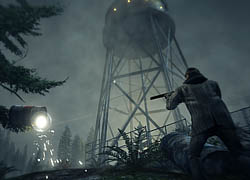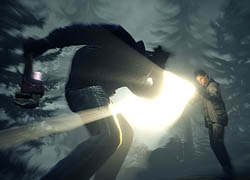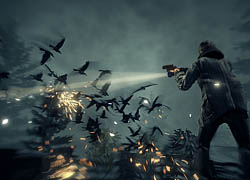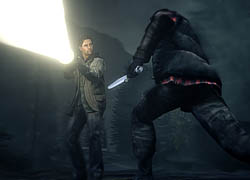Alan Wake follows the title character through his mundane life as he struggles with a horrible case of writers block. It's been two years since Alan has written anything of note and he is plagued by insomnia and nightmares. Finally, at the behest of his wife Alice, Alan decides to take a vacation with her to the quiet and tranquil town of Bright Falls in Washington.
Alan immediately feels out of place as a city boy in this rural backwater town. Everyone from the local radio DJ to the waitress at the main street diner begin to swoon over the great Alan Wake's presence as he realizes this is probably the closest thing most of these people ever get to touching Hollywood. Alan rushes to find the local grease monkey who seems to be in charge of his cabin's key, but comes across a haunting old woman instead who says the mechanic is indisposed at the moment, but left the key for him with her.
 Alan takes it without thinking twice and heads with Alice for the cabin on the lake. But things quickly go awry when night comes. The power goes out, Alice disappears, and before Alan knows it, he is sitting behind the wheel of his wrecked car and has no idea what has happened to him. All he knows is that he keeps stumbling across pages from a manuscript he can't remember writing and that he needs to find Alice. A mysterious dark presence though is working to make sure that our writer friend does not accomplish his mission and goes about possessing the normally peaceful townsfolk of Bright Falls and moving them into Alan's path. As Alan begins moving against the dark presence though, he also comes to realize that the manuscript he keeps stumbling across seems to have some precognitive abilities as he tries to shed some light on the puzzle laid out before him.
Alan takes it without thinking twice and heads with Alice for the cabin on the lake. But things quickly go awry when night comes. The power goes out, Alice disappears, and before Alan knows it, he is sitting behind the wheel of his wrecked car and has no idea what has happened to him. All he knows is that he keeps stumbling across pages from a manuscript he can't remember writing and that he needs to find Alice. A mysterious dark presence though is working to make sure that our writer friend does not accomplish his mission and goes about possessing the normally peaceful townsfolk of Bright Falls and moving them into Alan's path. As Alan begins moving against the dark presence though, he also comes to realize that the manuscript he keeps stumbling across seems to have some precognitive abilities as he tries to shed some light on the puzzle laid out before him.
I really can't say anymore beyond that with giving away the entire plot, but when they describe Alan Wake as a psychological thriller, they mean it. With more plot twists than a Twizzler, Alan Wake will have you on the edge of your seat as you get sucked into Alan's world and you addictively play your way through the six episodes that comprise the game.
And I do mean episodes. With heavy inspiration from shows like Lost, Twin Peaks, and The X-Files, Alan Wake is set up like a television show or HBO miniseries considering how long it'll probably take your average gamer to get through each one. With full previous episode recaps, theme music, and cliffhanger endings, Alan Wake is an accomplishment in video game storytelling and will have conspiracy theorists out there talking about it like several of the shows it drew its inspiration from.
 Alan Wake isn't just a spectacularly laid out story though. The gameplay is top notch for the most part as well. The townsfolk who are possessed by the dark energy live in the shadows and can come from almost anywhere. This gives you the stress of a survival horror's gameplay, but with a new factor of unpredictability as an enemy can literally come from any source of darkness, continuing the psychological thriller theme as you begin to dread looking around every new corner. Another aspect of this is that later in the game, not only are people becoming possessed, but also animals and even inanimate objects that violently hurl themselves in your path.
Alan Wake isn't just a spectacularly laid out story though. The gameplay is top notch for the most part as well. The townsfolk who are possessed by the dark energy live in the shadows and can come from almost anywhere. This gives you the stress of a survival horror's gameplay, but with a new factor of unpredictability as an enemy can literally come from any source of darkness, continuing the psychological thriller theme as you begin to dread looking around every new corner. Another aspect of this is that later in the game, not only are people becoming possessed, but also animals and even inanimate objects that violently hurl themselves in your path.
Since all of your enemies are comprised of shadows, Alan Wake incorporates a whole new way of fighting these unusual enemies as well. A shotgun or rifle is no longer you're greatest weapon, it is flares and flashlights. You must use whatever light sources you can find to wear down the shadow shields many of the possessed cloak themselves in before you can fire away with conventional weaponry. Your flashlight also works as an aiming sight for your weapons in order to eliminate any need for a conventional aiming system seen in most third person shooters. Even if you run of ammo though, a plethora of batteries for your flashlight could mean the difference between life and death as enemies can be held at bay with your light long enough for you to either find more ammo or to make it to a safe haven. This also means usually useless weapons can become juggernauts. Flash bang grenades can clear entire screens of enemies and a flare gun can become like a grenade launcher as they give off enough light to completely burn away the possessed.
There were a couple of problems I had with the gameplay though. The combat system was a little faulty in that the shadows are still clinging to actual people and in theory a head shot should do more damage than shots to the legs or torso and this was not the c ase. It became frustrating that three head shots with a pistol did the same amount of damage as three shots to the arm with the same weapon.
ase. It became frustrating that three head shots with a pistol did the same amount of damage as three shots to the arm with the same weapon.
Another frustrating thing was that the game incorporated a radar system in order to keep the player from getting completely lost in the massive Pacific Northwest wilderness that the game created. It was a nice feature, but I felt myself obsessing over it and it nudged me away from exploring as much as I should have.
The graphics also had a couple of problems. Although spectacular in many ways, from lighting effects that were obviously crucial to the gameplay mechanics to water and other environment effects, there were only maybe 10 enemy character models for the entire game. With a game that will probably take most gamers 12-15 hours to complete on hard mode, to see the same handful of models thrown at us, especially later in the game, was a sad sight indeed.
The wilderness was also somewhat bland at times. Although beautiful in terms of the horizon and sights in the distance, many trees, bushes, and other objects in the environment were very two dimensional when approached and seemed just randomly thrown in to help keep you on the designated path.
 The audio for the game was solid, but not spectacular. The original score and licensed music for the game really helped with the whole TV show feel and the SFX were spot-on, but the voice acting was only par with what we've come to expect nowadays. I'm not saying we needed Nolan North to play Alan Wake (since he seems to play every single other male video game character out there), but the voice acting seemed almost a little forced at times from many of the characters.
The audio for the game was solid, but not spectacular. The original score and licensed music for the game really helped with the whole TV show feel and the SFX were spot-on, but the voice acting was only par with what we've come to expect nowadays. I'm not saying we needed Nolan North to play Alan Wake (since he seems to play every single other male video game character out there), but the voice acting seemed almost a little forced at times from many of the characters.
Another positive for the game though is the replay value. Unlocking a "Nightmare" difficulty upon completion of your first playthrough, this new mode allows you a chance to collect additional pages of the mystical manuscript. There are also coffee thermoses and other collectibles to still gather after beating the game and there is some DLC guaranteed. What the DLC will garner, whether entirely new episodes or rumors of a multiplayer mode, we will have to wait and see. I admit, normally I would need a little more than that to garner game's replay value a positive, but the story is so good that any hope that it won't end is indeed a positive for me.
All in all though, Alan Wake is a game that stays with you. You become emotionally invested in these characters and that is a testament to the story laid out before you. Alan Wake is one of the best written games I've come across in a long time and if they plan on doing a sequel, hopefully it won't be delayed as much as this first game was.